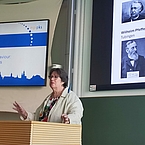
Chemotaxis – from Basic Physics to Biology
Impressions ...
... from the organisers: It was a very great success, in large part due to the MPI’s facilities and expertise in planning, and we were delighted to see a number of your members attending the meeting, in different combinations for different talks, and joining in and contributing with vigour. Lots of new alliances and ideas were generated.
Promoting truly cross-disciplinary work is challenging, but this meeting succeeded, with a satisfying level of engagement across disciplines from biology, engineering, chemistry and mathematics. We both look forward to seeing your institute again, perhaps as attendees at a future meeting inspired by this
one.
... from a participant: The biggest strength of this conference was its cross disciplinary scope. By bringing together perspectives from across a range of subjects and focussing them on one idea led to rich discussions.
... from an invited speaker: This in-house meeting was a fantastic experience, allowing me to interact with renowned scientists and young faculty fellows. It provided a wonderful platform to share ideas, discuss research, and foster international collaboration.
For a brilliant and inspiring opening, which set the creative and open spirit and conducted us throughout the entire meeting, Prof. Judith Armitage, emeritus at Oxford University and one of the pioneers in bacterial chemotaxis, gave an excellent historical abstract of the development of chemotaxis research in microbiology, spiced with her own experience and philosophical views on science - a true inspiration for all attendees.
Further highlights included:
• 16 invited speakers that joined us from all over the world to share their insights into a fascinating world of microagents migrating towards and away from food, danger or social interactions, all mediated through chemicals.
• Brilliant contributed talks that opened our eyes about all the exciting research that is going on around the globe - from Chile to China!
• Engaging poster discussions with early career researchers.
• Outreach talk - Dr. Christina Roggatz - 60 attendees including a class of pupils from Meissen, learning about the effects of pH on ocean chemistry and the way it changes animal behaviour and survival. Lively discussions and refreshments afterwards.
• Poster awards were funded by the RSC and awarded to Pieter de Visser and Barbara Borges Fernandes.
• The excursion on Wednesday was clearly a highlight: sunset hike with conference dinner at Pfaffenstein - we discussed new scientific ideas and exchanged about best practice in the lab, and therefore we have to disagree with Nature Physics! (Nat. Phys. 20, 677 (2024) - hikes are a great way to bring scientists together and talk!
Disciplines involved ranged from biologists presenting stunning examples of the miracles nature has developed over the course of evolution, to physicists and mathematicians coming up with models to extract the basic information essential for understanding, engineers, chemists and interdisciplinary scientists trying to engineer artificial analogies.
Looking towards the future, we collectively identified challenges for the field:
- unify nomenclature
- continue to adapt methods across different disciplines
- translate findings across different research areas
- enhance communication to increase and improve the research perspectives
- formulate a hypothesis how chemotaxis evolved
To conclude, we very much enjoyed the coordination of this fruitful meeting, which reflected extremely well on the Max Planck society and its organisational framework. We will dedicate thoughts on how to continue the collaboration and keep the spirit of the meeting.


